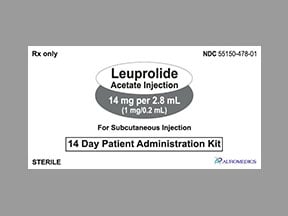
Leuprolide Coupons & Savings Card – Discount Prices from $86.79
Generic for: Lupron depot (1-month), Eligard
My prescription
Edit
1MG/0.2ML, Leuprolide (1 Kit)
Select pharmacy

CVS
$86.79
COUPON PRICE
Walgreens
$226.62
COUPON PRICE
Albertsons
$276.32
COUPON PRICE
Walmart
$720.30
COUPON PRICELeuprolide savings card
Show this card to your pharmacist
CVS
$86.79
BIN
ID
PCN
GRP
015995
LHKPV488247
GDC
DR33
Powered by
Related gonadotropin releasing hormone agonists prescriptions
More prescriptions for prostate cancer
Related gonadotropin releasing hormone agonists prescriptions
More prescriptions for prostate cancer
Price history for Lupron Depot (1-month) (brand) & Leuprolide (generic)
1 Kit, 1MG/0.2ML
Average retail price for Lupron Depot (1-month)
Average retail price for Leuprolide
Average SaveHealth price for Leuprolide
Our price history data is based on aggregated prescription data collected from participating pharmacies in America. Our prescription data updates daily to reflect the latest price changes. If you notice a missing data point, it means there wasn't sufficient data available to generate a monetary value for that date.
We analyzed Leuprolide prices for (1MG/0.2ML, 1 Kit) over the last 12 months. The average retail price was $891.00, while the average price using the SaveHealth discount card was $346.44. That's a savings of approximately 61.12% when using our Leuprolide coupon.
Compared to the generic version, Lupron Depot (1-month) had an average price of $2296.50 over the same time period. With the SaveHealth savings card, Leuprolide is 84.91% cheaper on average than Lupron Depot (1-month).
*Retail prices are based on pharmacy claims data, and may not be accurate when we don't have enough claims.
Leuprolide dosage forms
Dosage Quantity Price from Per unit 1MG/0.2ML 1 Kit $276.32 $276.32
| Dosage | Quantity | Price from | Per unit |
|---|---|---|---|
| 1MG/0.2ML | 1 Kit | $276.32 | $276.32 |
